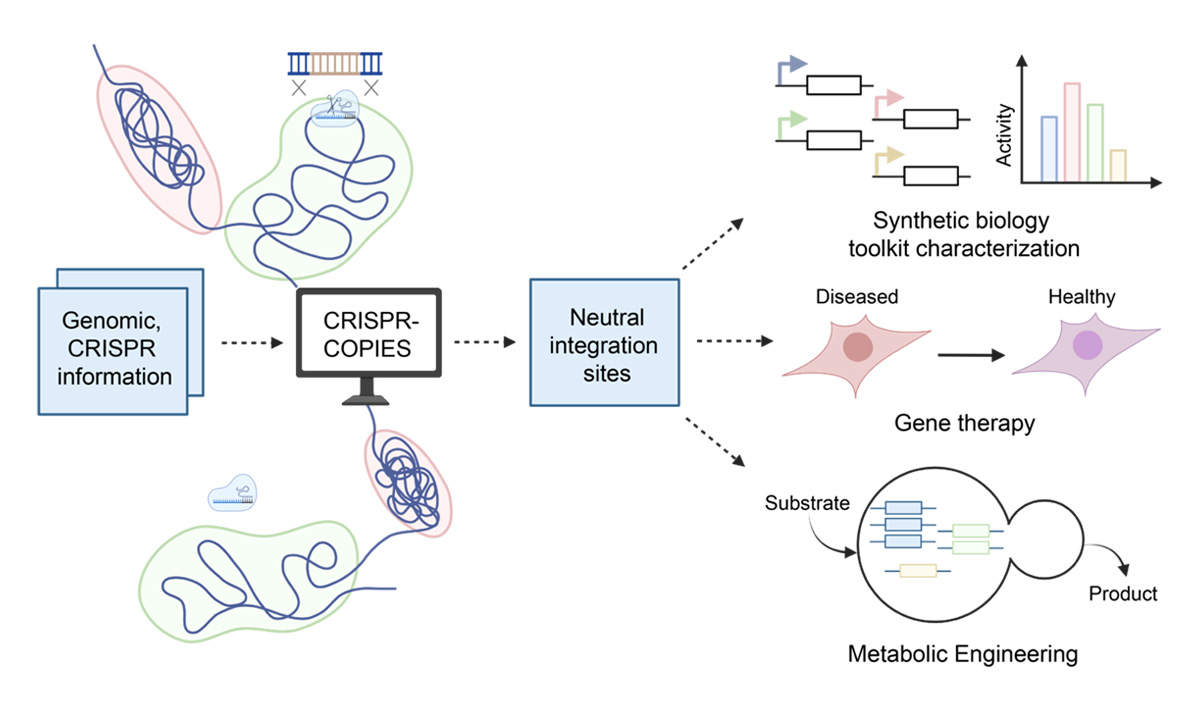
CRISPR-COPIES Accelerates and Optimizes Genome Editing
March 13, 2024| |
Researchers at the Center for Advanced Bioenergy and Bioproducts Innovation (CABBI) are further improving CRISPR's versatility and ease of use with a newly developed tool called CRISPR-COPIES, or COmputational Pipeline for the Identification of CRISPR-Cas-facilitated intEgration Sites. CRISPR-COPIES can identify genome-wide neutral integration sites for most bacterial and fungal genomes within two to three minutes.
In their paper published in Nucleic Acids Research, the researchers showed the versatility and scalability of CRISPR-COPIES by characterizing integration sites in three diverse species: Cupriavidus necator, Saccharomyces cerevisiae, and HEK 293T cells. They used integration sites found by CRISPR-COPIES to engineer cells with increased production of 5-aminolevulinic acid, a valuable biochemical that has applications in agriculture and the food industry. The team also created a user-friendly web interface for CRISPR-COPIES that can be accessed by researchers.
For engineering crops, CRISPR-COPIES can be used to increase biomass yields, pest resistance, and/or environmental resilience. For converting biomass to valuable chemicals — for instance, by using the yeast S. cerevisiae — CRISPR-COPIES can be used to engineer cells with significantly greater yields.
For more details, read the news release on the CABBI website.
| |
You might also like:
- The First Decade of CRISPR: Advances and Outlook
- Scientists Create CROPSR, A Tool to Accelerate Genetic Discoveries
- Pocket K No. 54: Plant Breeding Innovation: CRISPR-Cas9
Biotech Updates is a weekly newsletter of ISAAA, a not-for-profit organization. It is distributed for free to over 22,000 subscribers worldwide to inform them about the key developments in biosciences, especially in biotechnology. Your support will help us in our mission to feed the world with knowledge. You can help by donating as little as $10.
-
See more articles:
-
Gene Editing Supplement (March 13, 2024)
-
Research and Tools
- CRISPR Improves Leaf Rust Resistance of Wheat
- Study Pinpoints Key Gene in Seed Germination Control of Tomatoes
- Agroscope Gets Approval on Field Trial of Barley Modified Using CRISPR-Cas9
- CRISPR-COPIES Accelerates and Optimizes Genome Editing
- Multiplex Gene Editing Boosts Dietary Fiber Content in Barley
- Updates on Gene Editing Tomato with TALENs
-
Read the latest: - Biotech Updates (February 4, 2026)
- Gene Editing Supplement (January 28, 2026)
- Gene Drive Supplement (February 22, 2023)
-
Subscribe to BU: - Share
- Tweet

